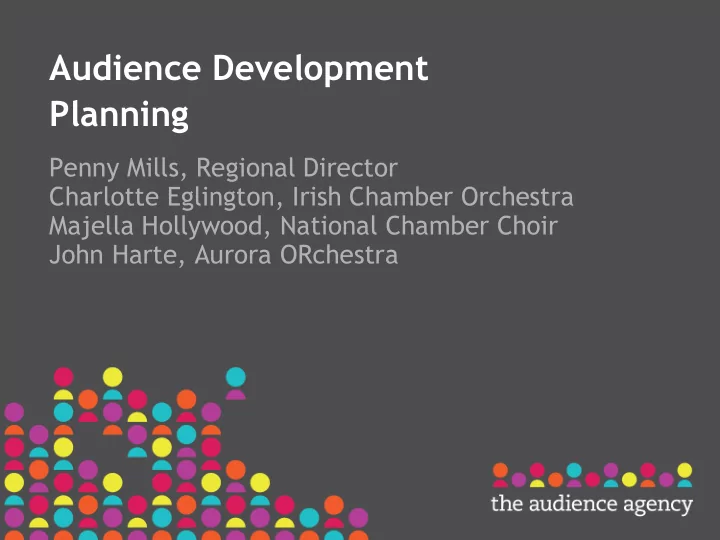

Audience Development Planning Penny Mills, Regional Director Charlotte Eglington, Irish Chamber Orchestra Majella Hollywood, National Chamber Choir John Harte, Aurora ORchestra
Outline of the day • Introductions • Audience development planning • Audience development plans • Irish Chamber Orchestra • National Chamber Choir • Lunch • Implementing the plan • Case Study – Aurora Orchestra
Some definitions
HLF definition: Audience development is about ambition. It is a planned and managed process that involves taking proactive steps to develop audiences…..Audience development can encompass marketing, education, outreach and community development and often works best when different approaches come together to engage people
Arts Council England definition: The term audience development describes activity which is undertaken specifically to meet the needs of existing and potential audiences and to help arts organisations to develop ongoing relationships with audiences. It can include aspects of marketing, commissioning, programming, education, customer care and distribution
Audiences - meeting our objectives Financial Audiences Social Cultural
The planning process "If you don't know where you are going, then you are sure to end up somewhere else". Mark Twain Mission Objectives Strategies The Plan Evaluation
The planning process "If you don't know where you are going, then you are sure to end up somewhere else". Mark Twain Mission Objectives Strategies The Plan Evaluation
Marketing Audit • What offer do we make to our audiences? • What do we know about our audiences? • How do our audiences respond? • How do we communicate with them? • What resources do we use to engage them? • Do we know if it is working? • What do we know, what don’t we know?
How to find out about your audiences Secondary/desk Primary research research Internal Quantitative External Qualitative
SWOT and TOWS Positive Negative Strengths Weaknesses Internal Opportunities Threats External
Identifying strategies Internal Strengths Weaknesses TOWS Opportunities SO strategies WO Strategies Use strengths to take Minimising weaknesses advantage of by taking advantage of opportunities opportunities External Threats ST strategies WT strategies Using strengths to Minimise the effect of overcome threats weaknesses and avoid threats
The planning process Mission Objectives Strategies Tactics Evaluation
It all starts with the mission The mission clarifies what the organisation is and isn’t for - insiders and outsiders What this then enables you to do is: • Create a sense of purpose from which strategy can follow • Provide the organisation with a long term perspective • Create unity around common vision and identity (Source: Stephen Cashman)
Brand Your brand is more than your name, logo or strapline – it relies on the following range of factors: • Values • Quality of past offerings and provision • Performance record/reputation • Customer service • Price (Source: Stephen Cashman)
The planning process Tactics Evaluation Mission Objectives Strategies
Setting SMART objectives Specific – Objectives should specify what they want to achieve Measurable – You should be able to measure whether you are meeting the objectives or not Agreed - Do the objectives have buy-in from all involved? Realistic – Can you realistically achieve the objectives with the resources you have? Timed – When do you want to achieve the set objectives by?
Creating SMART objectives Non SMART: Get young people to come back for a repeat visit Made SMART: Over the next 2 years, increase the proportion of people aged 16 - 24 who have attended once previously by 10%
The planning process Mission Objectives Strategies Tactics Evaluation
Strategic approach = Strategic approach Strategies + Identify and understand target audiences + Audience development approaches
Strategic approach: Ansoff matrix Programme Existing New Market penetration Product development Aim: retain, and increase the Aim: increase audience cross-over by frequency and attendance of, extending types of programme offered New Existing existing / lapsed audiences to existing audiences Audiences Market development Diversification Aim: attract new audiences to Aim: develop new types of programme existing programme offers to respond to the specific needs of new audiences
Identifying and understanding audiences = Strategic approach Strategies + Identify and understand target audiences + Audience development approaches
Segmentation Segmentation: “the process of splitting customers, or potential customers, within a market into different groups, or segments, within which customers have the same, or similar requirements satisfied by a distinct marketing mix.” McDonald & Dunbar (1998)
You can segment audiences by… Segmentation approach What it covers Demographics Age Life stage Social grade Family circumstances Ethnicity Geography Where people live Where people work Behaviour What people have done in the past Attitudes Values and beliefs
Irish Chamber Orchestra National Chamber Choir
Implementing the plan
The planning process Mission Objectives Strategies Tactics Evaluation
4Ps • Product • Place • Price • Promotion • People • Processes
Match the offer to your audiences segments Segment Benefits Messages Offer Local families Students Core / loyal / regular
Match the relevant tools to your audiences segments Segment Local press E-bulletin Facebook Posters ads competition Local families Students Etc
Irish Chamber Orchestra National Chamber Choir
The planning process Mission Objectives Strategies Tactics Evaluation
Monitoring and evaluation • Monitoring is about regularly measuring specific success criteria • Evaluation is about assessing whether (and how) your audience development activity achieved its intended aims
Evaluation criteria Did you achieve your SMART objectives ? For example: • Did you reach the right people? • Did you reach enough of them? • Did they behave how you hoped? • Was the experience of high enough quality? • Did you choose the right approach and tools?
Evaluation plan Project aim Measure of Information/ From How success evidence whom/where needed
Thank you and goodbye penny.mills@theaudienceagency.org
John Harte Chief Executive Aurora Orchestra
Recommend
More recommend